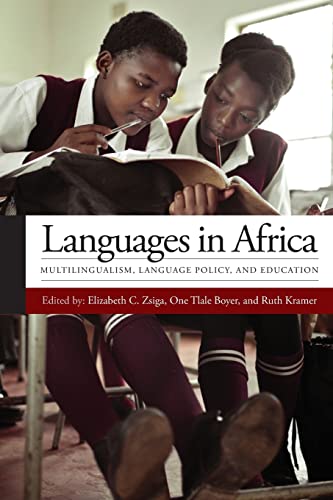Languages in Africa: Multilingualism, Language Policy, and Education (Georgetown University Round Table on Languages and Linguistics series) - Softcover
Buch 3 von 8: Georgetown University Round Table on Languages and Linguistics
Inhaltsangabe
People in many African communities live within a series of concentric circles when it comes to language. In a small group, a speaker uses an often unwritten and endangered mother tongue that is rarely used in school. A national indigenous language-written, widespread, sometimes used in school-surrounds it. An international language like French or English, a vestige of colonialism, carries prestige, is used in higher education, and promises mobility-and yet it will not be well known by its users.
The essays in Languages in Africa explore the layers of African multilingualism as they affect language policy and education. Through case studies ranging across the continent, the contributors consider multilingualism in the classroom as well as in domains ranging from music and film to politics and figurative language. The contributors report on the widespread devaluing and even death of indigenous languages. They also investigate how poor teacher training leads to language-related failures in education. At the same time, they demonstrate that education in a mother tongue can work, linguists can use their expertise to provoke changes in language policies, and linguistic creativity thrives in these multilingual communities.
Die Inhaltsangabe kann sich auf eine andere Ausgabe dieses Titels beziehen.
Über die Autorin bzw. den Autor
Elizabeth C. Zsiga is a professor in the linguistics department at Georgetown University. One Tlale Boyer is a postdoctoral research associate in the linguistics department at Georgetown University. Ruth Kramer is an assistant professor in the linguistics department at Georgetown University.
„Über diesen Titel“ kann sich auf eine andere Ausgabe dieses Titels beziehen.
Suchergebnisse für Languages in Africa: Multilingualism, Language Policy,...
Languages in Africa: Multilingualism, Language Policy, and Education (Georgetown University Round Table on Languages and Linguistics)
Anbieter: HPB-Red, Dallas, TX, USA
paperback. Zustand: Good. Connecting readers with great books since 1972! Used textbooks may not include companion materials such as access codes, etc. May have some wear or writing/highlighting. We ship orders daily and Customer Service is our top priority! Bestandsnummer des Verkäufers S_373696404
Languages in Africa: Multilingualism, Language Policy, and Education
Anbieter: Row By Row Bookshop, Sugar Grove, NC, USA
Trade Paperback. Zustand: Good. Zustand des Schutzumschlags: No Dust Jacket. First Edition. An ex-library copy in original paper covers, with the usual ex-libris markings (but no card pocket). The binding is sound, the text is clean/unmarked, and there is little cover wear. Book. Bestandsnummer des Verkäufers 061967
Languages in Africa : Multilingualism, Language Policy, and Education
Anbieter: GreatBookPrices, Columbia, MD, USA
Zustand: As New. Unread book in perfect condition. Bestandsnummer des Verkäufers 22176528
Languages in Africa
Anbieter: PBShop.store UK, Fairford, GLOS, Vereinigtes Königreich
PAP. Zustand: New. New Book. Shipped from UK. Established seller since 2000. Bestandsnummer des Verkäufers CX-9781626161528
Neu kaufen
Anzahl: 15 verfügbar
Languages in Africa : Multilingualism, Language Policy, and Education
Anbieter: GreatBookPrices, Columbia, MD, USA
Zustand: New. Bestandsnummer des Verkäufers 22176528-n
Languages in Africa : Multilingualism, Language Policy, and Education
Anbieter: GreatBookPricesUK, Woodford Green, Vereinigtes Königreich
Zustand: New. Bestandsnummer des Verkäufers 22176528-n
Neu kaufen
Anzahl: 7 verfügbar
Languages in Africa: Multilingualism, Language Policy, and Education (Georgetown University Round Table on Languages and Linguistics)
Anbieter: Lucky's Textbooks, Dallas, TX, USA
Zustand: New. Bestandsnummer des Verkäufers ABLIING23Mar2811580166612
Neu kaufen
Anzahl: Mehr als 20 verfügbar
Languages in Africa: Multilingualism, Language Policy, and Education (Georgetown University Round Table on Languages and Linguistics)
Anbieter: Best Price, Torrance, CA, USA
Zustand: New. SUPER FAST SHIPPING. Bestandsnummer des Verkäufers 9781626161528
Languages in Africa : Multilingualism, Language Policy, and Education
Anbieter: GreatBookPricesUK, Woodford Green, Vereinigtes Königreich
Zustand: As New. Unread book in perfect condition. Bestandsnummer des Verkäufers 22176528
Gebraucht kaufen
Anzahl: 7 verfügbar
Languages in Africa (Paperback)
Anbieter: Grand Eagle Retail, Bensenville, IL, USA
Paperback. Zustand: new. Paperback. People in many African communities live within a series of concentric circles when it comes to language. In a small group, a speaker uses an often unwritten and endangered mother tongue that is rarely used in school. A national indigenous language - written, widespread, sometimes used in school - surrounds it. An international language like French or English, a vestige of colonialism, carries prestige, is used in higher education, and promises mobility - and yet it will not be well known by its users. The essays in Languages in Africa explore the layers of African multilingualism as they affect language policy and education. Through case studies ranging across the continent, the contributors consider multilingualism in the classroom as well as in domains ranging from music and film to politics and figurative language. The contributors report on the widespread devaluing and even death of indigenous languages. They also investigate how poor teacher training leads to language-related failures in education.At the same time, they demonstrate that education in a mother tongue can work, linguists can use their expertise to provoke changes in language policies, and linguistic creativity thrives in these multilingual communities. Explore the layers of African multilingualism as they affect language policy and education. This book includes case studies ranging across the continent, the contributors consider multilingualism in the classroom as well as in domains ranging from music and film to politics. It also reveals how poor teacher training leads to failures in education. Shipping may be from multiple locations in the US or from the UK, depending on stock availability. Bestandsnummer des Verkäufers 9781626161528
